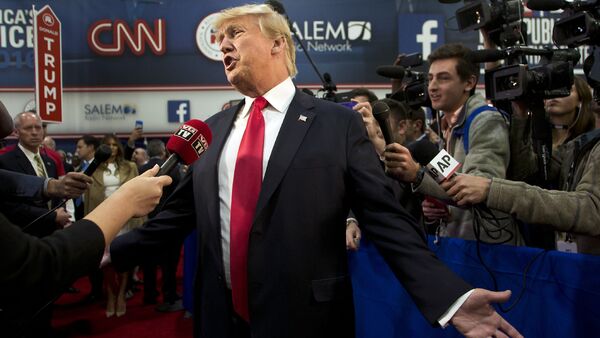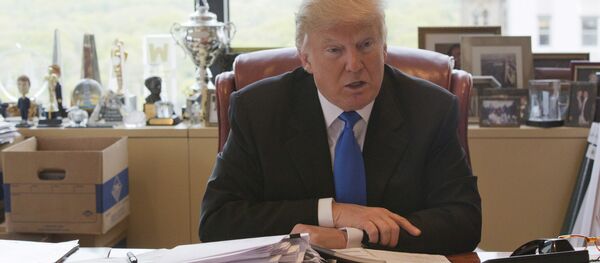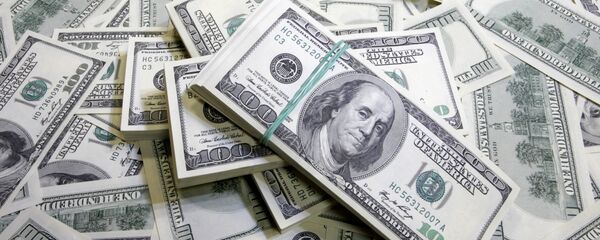Kristian Rouz – GOP presidential nominee Donald Trump has distanced himself from the party platform in a statement appealing to working class families in an interview broadcast on national television on Tuesday. In addition to backing what he considers a reasonable increase in federal minimum pay, Trump has voiced his support for individual states having more leeway in making decisions on minimum hourly wage hikes.
The GOP presidential nominee voiced his support for higher minimum pay, addressing yet another wave of criticism from the Democrat camp, this time the failed revolutionary Bernie Sanders. After Sanders said during his DNC speech the other day that Trump supports tax breaks for the rich and lowering minimum pay to below the current federal bottom of $7.25/hour, the GOP candidate said in a Fox News broadcast on Tuesday that he actually favors a higher federal minimum wage. However, he added that states should have the final say on the minimum wage within their jurisdictions, he added.
“I would leave it and raise it somewhat. You need to help people and I know it’s not very Republican to say but you need to help people,” Trump said in his interview with Bill O’Reilly on Fox News.
Trump said raising the federal minimum wage by $2.75 – to $10/hour – would be reasonable. The issue of states’ rights, however, complicates the broader picture, as the federal government’s authority is constitutionally limited on matters such as minimum wage. However, Trump claims to know his way around the matter.
"In fact, some of the folks on your network said, 'Wow that was really a lie; he (Sanders) said that I wanted to go less than minimum wage' — this is a new one because I'm the one Republican that said in some cases we have to go more than minimum wage, but what I like is states," Trump said.
Minimum wage regulations, Trump noted, are most feasible when based on the living costs in each particular area, rendering the federal level regulations largely irrelevant to the economic reality in different regions of the US. With a $10/hour federal minimum wage, individual states, he claims, could even go way above that threshold.
"You go with the states — let the states make the determination because if you take New York, it's very expensive to live in New York, they need more than you know seven, eight, nine dollars," Trump said. "So you go with the states and let the states make the determination."
Trump reiterated his intent to promote job creation rather than expanding the scope of social benefits. Federal minimum wage regulations would undoubtedly affect US business activity, but, according to Trump’s plan, customs tariffs and the expansion of the taxable base via cuts in tax rates would make up for the losses resulting from higher minimum pay.
"I would say $10, but with the understanding that somebody like me is going to bring back jobs, I don't want people to be in that $10 category for very long,” Trump said, hinting at a coming era of neo-isolationist prosperity harkening back to the Roaring Twenties, mid-1950s economic boom and Reaganomics.
The Trump administration would most likely impose higher customs tariffs so that, as Trump said, “the states compete with each other, not … other countries”, resulting in the better performance of US manufacturing and agriculture, which would gain momentum on the back of massive domestic demand. Higher wages pretty much fit into Trump’s economic plan as in the higher tariffs environment, a better-earning consumer would push both inflation and the broader economy higher, allowing for the long-overdue normalization of the Federal Reserve’s monetary policies.
“I think people should get more," Trump concluded.
"A Trump presidency would no doubt hurt Asia’s gross domestic product growth and could ultimately drive cost-push inflation, impart smaller trade surpluses and looser macroeconomic policies," said Rob Subbaraman of Nomura Holdings Inc.
Apparently, Trump is aiming to avert the looming recession by realigning the supply-side of the US economy with the domestic consumer.
Accompanied with robust job creation – if Trump is capable of achieving that – raises in minimum wage and higher inflation could benefit domestic-oriented manufacturers. However, such a model would only be viable in the US if Trump is able to create a less-offshored and disinvested economic reality in the US – his first order of business if elected.




